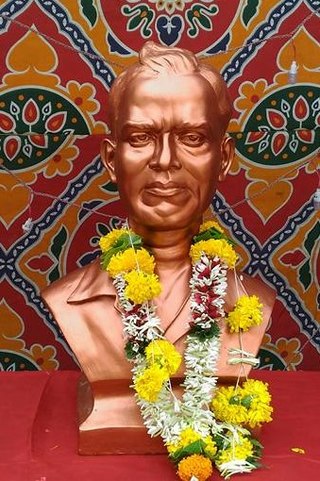Krishna Desai
Indian politician From Wikipedia, the free encyclopedia
Krishna Desai (13 October 1877 - 5 June 1970) was a member of the Communist Party of India (CPI).
Krishna Desai | |
|---|---|
 Statue of Krishna Desai at Tavari Pavda Lalbaug, Mumbai, where he was killed | |
| Member of the Maharashtra Legislative Assembly | |
| Assumed office 1967 - 1970 | |
| Constituency | Parel |
| Personal details | |
| Born | Valsad, Gujarat |
| Died | 5 June 1970 (aged 92) Lalbaug, Mumbai |
| Manner of death | Assassination (stab wound) |
| Nationality | Indian |
| Political party | Communist Party of India |
Life
He was a Member of Maharashtra Legislative Assembly Legislative Assembly of Maharashtra who represented the working-class Mumbai constituency of Parel, then a communist stronghold. Desai was murdered in 1970, and this was preceded by the burning of the office of the CPI-led Girni Kamgar Union. Hansen considers his murder to be the culmination of the Shiv Sena campaign against the communists. His murder was a sign of a Sena victory in its struggle for the domination of unions and politics in Mumbai's working class district.[1][2]
Death

Desai was stabbed to death on 5 June 1970. He was a sitting MLA when he was murdered.[3][4] Seven suspects were arrested on 8 June 1970. Nineteen young persons were charged and sixteen were convicted for the murder. The accused were defended by Ram Jethmalani. Balasaheb Thackeray's complicity in the murder was never proven. Prakash writes that those convicted were members of the Shiv Sena.[5] According to Dipankar Gupta, the Shiv Sena chief Bal Thackeray congratulated those who killed Desai, declaring, "we must not miss a single opportunity to massacre communists wherever we find them."[6][7]
Aftermath
In the special by-election held in October 1970, his wife Sarojini Desai was nominated by the CPI,[5] but she was defeated by the Shiv Sena candidate Wamanrao Mahadik by a narrow margin of 1679 votes (of the nearly 62000 votes cast).[8]
According to the communists, the then Indian National Congress government had an interest in weakening and driving out the communists, and so it "supported the incident".[9]
See also
References
Wikiwand - on
Seamless Wikipedia browsing. On steroids.
